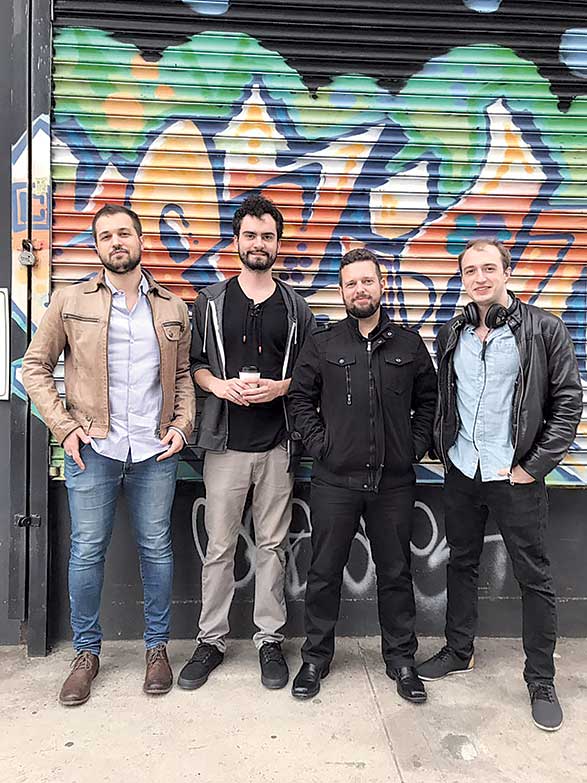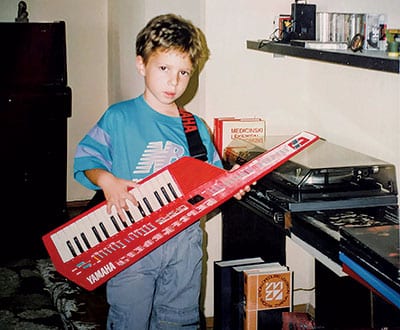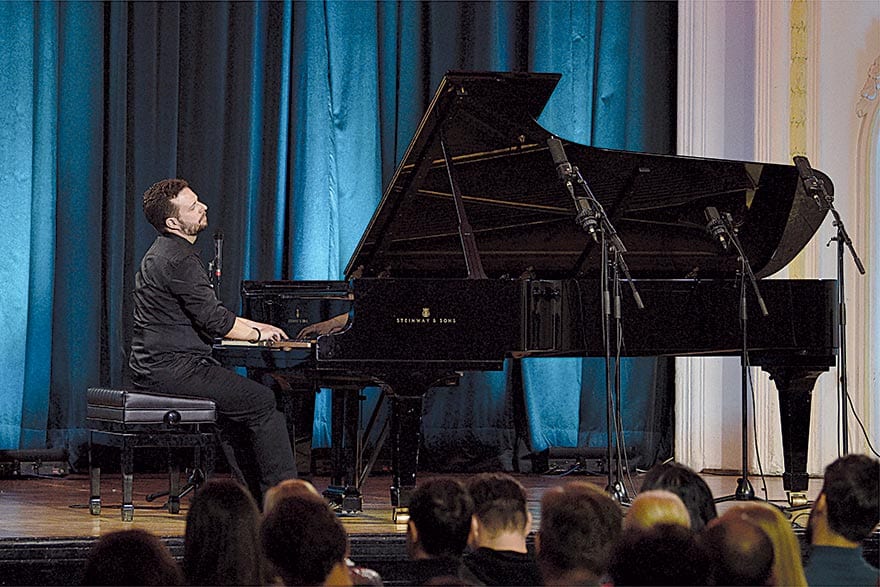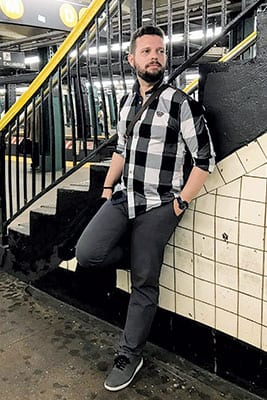After 12 years, Serbian artist Dimitrije Vasiljević (born 1985) held two exceptional concerts in Serbia with his New York Quartet (18th May, within the scope of the 35th Jazz Festival in Valjevo, and 20th May, at Kolarac Endowment Hall in Belgrade) and one in the Republika Srpska capital of Banja Luka. With his band comprising top musicians – Brazilian guitarist Ricardo Grilli, American bassist Ben Tiberio and French drummer Raphael Pannier – Vasiljević presented his original compositions to the audience, including those from his latest album “Accidental Nomad”, released by Ropeadope Records, which was this year shortlisted for nominations for Grammy awards in four categories – Best Jazz Album, Best Contemporary Instrumental Album, Best Instrumental Arrangement and Best Instrumental Composition
The stylistic direction of this young artist, who has lived and to has been living and creating in the United States for years, represents a sophisticated combination of American jazz, European classical heritage and traditional Serbian music. He graduated from the Faculty of Music in Belgrade (2006) and the Berklee College of Music in Boston (2010). He completed his Master’s studies in jazz piano at New York University Steinhardt (2013) and received his DMA. From the University of Illinois at Urbana-Champaign (2017), thereby becoming the first Serb to earn a doctorate in the field of jazz piano. Prior to becoming an assistant professor at the Xavier University of Louisiana in New Orleans, where he currently works as a professor of jazz piano, he was an adjunct professor at NYU Steinhardt, as well as a teaching assistant at the University of Illinois.
Why did you decide to leave Serbia and how – regardless of the great success you enjoy – do you handle being separated from your family and homeland?
I left Serbia at the age of 22, and the only reason was music. For years prior to departing, I tried to learn to play jazz, on my own, but that was hardly possible without a school, a serious scene and an educated audience. I managed to learn some basics, but to achieve more advanced levels and gain structured musical knowledge it was necessary for me to go to an environment that could provide that in a serious and systematic way. I’m not one of those people who always dreamt of America and the West, who had a desire to go there due to some ideological beliefs or to achieve financial success.

I’ve never personally felt like an immigrant or a member of the diaspora because I moved abroad with a clear goal – to improve as much as possible my musical craftsmanship, which I want to deal with at the highest possible level of quality. I chose America because of Berklee, where I wanted to study, and which is located in Boston. If Berklee was in China, I’d probably have gone there.
As for nostalgia, that’s a disease of the past, because today – in the era of the internet and advanced telecommunication systems – you can always keep in touch with your friends, parents and relatives in Serbia, and by working in America you can easily afford to fly home whenever you want. A much greater challenge than nostalgia is posed by the culture shock that everyone moving from Serbia to America experiences, to a greater or lesser extent. It took me years to adjust completely to the culture, customs, mentality and life of Americans, and initially, it wasn’t easy at all. However, a great desire to fit in and achieve success on the music scene helped me to resist all temptations of that type, and to ultimately realise that I can enjoy myself equally in America and Serbia, though of course in different ways.
I’ve never personally felt like an emigrant or a member of the diaspora, because I moved abroad with a clear goal – to improve as much as possible my musical craftsmanship, which I want to deal with at the highest possible level of quality
Nowadays I spend eight months of the year in America and as much as four months in Serbia because I managed to arrange my job, career and personal life in such a way that I never miss Serbia when I am in the USA, or vice versa.
Your first Belgrade performance was the fruit of your own initiative. What kind of significance did it have for you in a professional and private sense, and were you particularly nervous with stage fright before the concert?
 I had a desire for some time to show the Serbian audience what I’ve been doing in America for years. For various technical and logistical reasons, that wasn’t possible until this year, when the organisers of the Valjevo Jazz Festival invited me to participate in this event and secured funds and logistical support for me and my quartet from New York to fly to Serbia and perform at the festival, and with that opportunity having already been confirmed, I also scheduled a concert at Kolarac, in my hometown, and a few days later in Banja Luka, where I already had a very successful solo piano concert a few months earlier. Playing in front of an audience from one’s homeland brings a special kind of excitement, primarily because we hadn’t seen each other for 12 years, and I also presented my original music to them for the first time. Although my main scene is the one in America, these three Serbian concerts represented very important personal satisfaction for me, because I’m extremely connected to my city and my country. Being able to share with your own people that which you’ve perfected thousands of kilometres away over a decade for the first time is really a very special experience that made me very excited and left an indelible mark on me.
I had a desire for some time to show the Serbian audience what I’ve been doing in America for years. For various technical and logistical reasons, that wasn’t possible until this year, when the organisers of the Valjevo Jazz Festival invited me to participate in this event and secured funds and logistical support for me and my quartet from New York to fly to Serbia and perform at the festival, and with that opportunity having already been confirmed, I also scheduled a concert at Kolarac, in my hometown, and a few days later in Banja Luka, where I already had a very successful solo piano concert a few months earlier. Playing in front of an audience from one’s homeland brings a special kind of excitement, primarily because we hadn’t seen each other for 12 years, and I also presented my original music to them for the first time. Although my main scene is the one in America, these three Serbian concerts represented very important personal satisfaction for me, because I’m extremely connected to my city and my country. Being able to share with your own people that which you’ve perfected thousands of kilometres away over a decade for the first time is really a very special experience that made me very excited and left an indelible mark on me.
Continuing on the topic of projects, which of your compositions, projects or performance to date are you most proud of and why?
Everyone always mentions the Carnegie Hall or Kennedy Center performances as my most important concerts to date, but I cannot take it out of context in this way. I’m equally proud of all three albums that I’ve released to date, as well as the fourth that will soon be released. I’m proud of every concert, regardless of how small or big, it was because I learned something new from each one. I’m proud of my collaboration with musicians from my trio, quartet and quintet, as well as the many other musicians whose original projects I’ve worked on – all of that is part of the whole. However, I’m not only proud of my successes, but also my failures and shortcomings, because they taught me new ways of thinking and modesty. So, when I look back, I don’t have much to regret; I think that every day dealing with music has brought me such a unique quality of life that I would struggle to experience if I worked in some other field.
When I look back, I don’t have much to regret; I think that every day dealing with music has brought such a unique quality of life that I would struggle to experience if I worked in some other field
Jazz musicians learn mostly by listening. In that context, what and who has left the strongest impression on your artistic journey, but also on your music?
That used to be true, but today it’s not true to the extent that it was in the past. Listening is the key and indispensable source of knowledge and music information when learning jazz, but the theory is what forms the backbone of everyone’s jazz mastery when it comes to a jazz musician who’s anywhere near serious. Once upon a time, while jazz was still “street”, or even buskers’ music”, it was much simpler than it is today in performance and musical terms, so musicians more easily “copied” tricks from one another, learning from listening, while very often being theoretically ignorant.
Nowadays, however, modern jazz musicians are expected to be like special forces soldiers – able to handle various jazz sub-genres, to have a huge repertoire, a polished improvisational line, to be moulded by the craft to the maximum and technically superior. In order for all of that to fit into one lifetime (or into just a few years, which is how long the basic training of a jazz musician lasts nowadays, structured and very precise theoretical systems are necessary, in order to shorten the process and ensure its maximum efficiency.

Those systems are taught in schools, in jazz departments around the world, and listening to such music then becomes just one of a series of essential activities in the education of jazz musicians. When it comes to my style, dozens, if not hundreds of different musical influences are woven into it, and not just jazz musicians. Some of the artists I always return to include Brad Mehldau, Aaron Parks, Tigran Hamasyan, Vardan Ovsepian, Tomasz Stańko, Taylor Eigsti, Stravinsky, Prokofiev, Debussy, Ravel, Brahms and Chopin, but also various rock and pop artists, film scores, electronic music, traditional Serbian music, as well as ethnic music from various world cultures.
Nowadays, given that jazz has transcended the framework of a musical genre and has become a kind of communication system, each individual musician is familiar with and trained in all stylistic forms of jazz from the past, but they ultimately adapt the language of jazz to their own dialect and thereby create a very personalised musical style, which is still characterised as jazz, but which sounds unique and characteristic to each artist individually. Jazz is today the personal music stamp of every modern musician who deals with improvisational music.
What was the greatest challenge of your career to date?
There are two challenges that are the greatest. The first is to know at any given moment the qualitative and artistic level you are at, to be honest with yourself on this issue, without illusions and self-denial, and then to always strive to perfect and improve your craft and aesthetic possibilities and visions. The second is to remain consistent as an artist. Don’t accept compromises, don’t play that which you don’t believe in, don’t sell out your faith for a dinner, in the artistic sense.
Temptations are always great, but when an artist knows the way in which they’re headed, in which direction, what their plans and possibilities are, then they don’t allow the winds blowing from all sides to carry them away, let alone lead them astray. I consider that, after a lot of training and effort, I managed to resist these challenges very well, and that today I manage to cope easily, in both the worse and better moments of my career, and really remain at the level required by the task when it comes to this issue.
What do you consider as success and how do you protect yourself from the well-known trap known as “hubris”, to which nobody is immune?
I consider success as being when we find within ourselves that which we really love, and then we work on that and ultimately manage to achieve it. However, that’s not the end by any means, because it is only then that we are confronted by learning about how to enjoy the fruits of our labours (which is actually a very complicated skill), and how to further improve and expand on that, planting some new seed in that fertile soil.
Hubris is the most dangerous of all sins, and it particularly infests artists and public workers, people from the stage. It’s very difficult in a situation where hundreds or even thousands of people are cheering for you, when everyone is patting you on the back, when the media praises you to the max, to remain true to yourself and modest, and to not think even furtively, even for a moment – hey, I feel like I am God himself. But it is a big trap in which many great and who knows how many lesser artists, fall into sooner or later. I’m spared by my faith in God, reading the scriptures and writings of spiritual orthodox fathers.
On Sunday mornings for the Liturgy, the idea is to leave at the threshold everything you are and you aren’t – titles, reputation, popularity, status and position in society, but also insecurities, complexes and defeats, and only then to enter as you truly are, under all those glossy or gloomy things that threaten you 24 hours a day. If that is the person you are, hubris flees from you on its own.
In terms of music, I don’t deal only with jazz, but also with film scores and electronic music, composing, playing, arranging, and lecturing. I actually try build several personalities, which ultimately merge into one – the one that represents me as a whole person
Do you manage to make a difference and strike a balance between your profession, love for music, hobbies and private life?
Absolutely. I’m not one of those musicians who talk exclusively about music and who only know about that. I love music, of course, and it is inextricably part of my life, but I consider that a serious artist must also be broadly educated, as well as being interested in many other things besides art itself. Specifically, I have various hobbies, such as model making and prose writing. I read, am interested in history, painting, various sports and martial arts. In terms of music, I don’t deal only with jazz, but also with film scoring and electronic music, composing, playing, arranging and teaching. I actually try to build several personalities, which ultimately merge into one – the one that represents me as a whole person. However, each of these individual personalities has its own loves, aspirations and passions, and in that way contributes to the wider picture and integrity of what ultimately represents me as Dimitrije, as an artist, and, of course, as a human being.
Do you have any “hidden” talents?
I keep discovering new talents, but also antitalents, within myself again and again. I first started as a musician, and then I later discovered that I have a gift for composing. The latest talent I discovered in music is teaching. Since I started working as a professor, I’ve learned a lot about transferring knowledge to others, but I think I generally do that well and that I have that human, natural knack for working with students. Beyond music, I write. So far, it has been mostly writing on Facebook, but many people have recently started following me because of those writings, knack who read what I write and encourage me to write a book, which I’m still sceptical about, but they might eventually convince me to do it. Who knows? I also deal with 3D printing, painting and making medieval models of objects and miniatures. I also don’t think I’m bad when it comes to graphic design, though of course at some basic, amateur level.
Given that you spend a lot of time thinking about music, that you have a doctorate in jazz and work as a professor, is the written word perhaps some future basis for your artistic expression?

Jazz, and music generally, requires thorough and disciplined work, but also – on the other side – passion and love… in addition to that standard equation in which elements are added and subtracted, I would add a third – a clever mind and lots of wisdom
When it comes to expert literature, that’s a certainty. At this moment I’m preparing two textbooks that I’m currently working on, and as for this other, optional writing, I still don’t know. I believe that I’ll someday also shape that into some kind of book or collection of texts that I’ve been posting almost daily on Facebook over the last couple of years – if for nothing else but the people who follow me in huge numbers, and who like to read my texts.
How does a jazz musician relax without music?
I wouldn’t exactly know, because I don’t consider myself a standard representative of jazz musicians. Among many of my colleagues – I often notice either an excessive obsession with (jazz) music, constant talking, jest, jokes, a way of life, everything totally subordinated to that, or an inclination towards various vices, a disorderly life and dangerous substances. I am not part of any of these stories, and I have to admit that I relax the best, when not playing music, by spending my time with people dear to me who are not jazz musicians and are mostly far from the music scene.
What advice would you give to young musicians who are just discovering jazz or have decided to improve in this field?
I would advise them to learn thoroughly and to progress in sequence, without skipping any of the essential steps. Jazz, and music generally, requires thorough and disciplined work, but also – on the other side – passion and love. Kids today often do things hastily and want everything now, immediately, then they do everything back to front – forming bands, creating images, recording expensive music videos, and they still haven’t even completed basic music training, let alone honed their skills. On the other hand, there are those who are super talented and diligent, but who don’t have enough ambition, because that same ambition doesn’t extend beyond the local jazz club. So, in addition to that standard equation in which elements are added and subtracted, I would add a third – a clever mind and lots of wisdom.